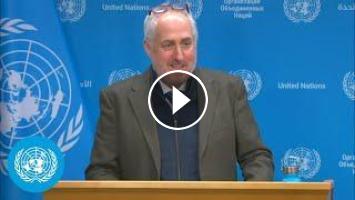Noon briefing by Stéphane Dujarric, Spokesperson for the Secretary-General.
Highlights:
- Secretary-General/Travels.
- Deputy Secretary-General/Travels.
- Occupied Palestinian Territories.
- Democratic Republic of the Congo.
- Sudan.
- Ukraine.
- Security Council.
- Senior Personnel Appointment.
SG TRAVEL
The Secretary-General is now on his way back to New York from Geneva where he delivered remarks at the opening of the High-level segment of the 55th session of the Human Rights Council.
He warned that human rights are the bedrock of peace, and today, both are under attack.
The Secretary-General noted that around the world, violence is increasing, and conflict-related human rights violations are spreading. He stressed international humanitarian law is clear: All parties must always distinguish between civilians and combatants.
The Secretary-General pointed out that human rights conventions and humanitarian law are based on cold, hard reality: They recognize that terrorizing civilians and depriving them of food, water, and healthcare is a recipe for endless anger, alienation, extremism and conflict.
He said that today’s warmongers cannot erase the clear lesson of the past, stressing that protecting human rights protects us all.
Before leaving Geneva, he also delivered remarks at the Conference on Disarmament. He noted that despite the current diplomatic deadlock, the central premise behind the Conference on disarmament remains as vital as ever, stressing that the most effective disarmament tool is inclusive diplomacy. We need that diplomacy urgently, he said. He said also that the conference is currently failing in its objective.
And in a press encounter, he was asked about the latest negotiations concerning Gaza, and he stressed that the United Nations continues to call for a humanitarian ceasefire and the immediate and unconditional release of all hostages, adding that nevertheless, we fully support any efforts that will lead to the liberation of hostages and to the reduction of the suffering of the Palestinian people.
DEPUTY SECRETARY-GENERAL
The Deputy Secretary-General is also on her way back to New York. She was in Windhoek, in Namibia, this past weekend to attend the Memorial Service for Dr. Hage G. Geingob, the former President of the Republic of Namibia.
On Sunday morning, Ms. Mohammed attended the burial service prior to her departure back home.
And on the sidelines of her visit, she also held a meeting with Monica Geingos, the Former First Lady of Namibia.
OPT
The Secretary-General takes note of today’s announcement by Palestinian Prime Minister Mohammed Shtayyeh that he handed to President Abbas his Government’s resignation.
The United Nations stands ready to continue supporting efforts aimed at overcoming the humanitarian, political, financial as well as security challenges facing the Palestinian people.
A strengthened, empowered Palestinian Government, that can administer the whole of the occupied Palestinian Territory, is critical as part of a path to achieving the establishment of a fully independent, democratic, contiguous, sovereign and viable Palestinian State, on the basis of the 1967 lines, of which Gaza is an integral part, which remains the only way to achieve a lasting peace.
And turning to the situation on the ground, the Palestine Red Crescent Society, supported by our colleagues of the World Health Organization and the Office for the Coordination of Humanitarian Affairs, have completed the evacuation of 72 critical patients from Nasser Hospital in Khan Younis. That hospital still struggles to operate with no electricity or running water, shortages of food and water supplies, the accumulation of solid waste, and sewage overflow.
The United Nations Population Fund (UNFPA) for its part, reports that newborns are dying in Gaza because their mothers are unable to attend prenatal or postnatal check-ups while the incessant bombings, fleeing for safety and anxiety are leading to premature births.
UNFPA says there are only five beds for deliveries at the Al Helal Al Emirati maternity ward hospital in Rafah, one of the few remaining functioning hospitals in Gaza. Despite the lack of such basic needs as sheets, the facility has had to cope with 78 deliveries in one night.
We and our partners are doing everything we can to provide food and assistance across Gaza, despite major challenges, including ongoing airstrikes and heavy fighting.
Last week, more than a dozen of our partners reached 1.7 million people with food across Gaza. Half of those supplies went to Rafah Governorate, with the rest going to Deir al Balah, Khan Younis and the north.
To do more, we need safe and unimpeded routes in Gaza. We also need more trucks and fuel inside Gaza to ensure a consistent and dependable food supply.
Full Highlights
https://www.un.org/sg/en/content/noon-briefing-highlight?date%5Bvalue%5D%5Bdate%5D=26%20February%202024
Highlights:
- Secretary-General/Travels.
- Deputy Secretary-General/Travels.
- Occupied Palestinian Territories.
- Democratic Republic of the Congo.
- Sudan.
- Ukraine.
- Security Council.
- Senior Personnel Appointment.
SG TRAVEL
The Secretary-General is now on his way back to New York from Geneva where he delivered remarks at the opening of the High-level segment of the 55th session of the Human Rights Council.
He warned that human rights are the bedrock of peace, and today, both are under attack.
The Secretary-General noted that around the world, violence is increasing, and conflict-related human rights violations are spreading. He stressed international humanitarian law is clear: All parties must always distinguish between civilians and combatants.
The Secretary-General pointed out that human rights conventions and humanitarian law are based on cold, hard reality: They recognize that terrorizing civilians and depriving them of food, water, and healthcare is a recipe for endless anger, alienation, extremism and conflict.
He said that today’s warmongers cannot erase the clear lesson of the past, stressing that protecting human rights protects us all.
Before leaving Geneva, he also delivered remarks at the Conference on Disarmament. He noted that despite the current diplomatic deadlock, the central premise behind the Conference on disarmament remains as vital as ever, stressing that the most effective disarmament tool is inclusive diplomacy. We need that diplomacy urgently, he said. He said also that the conference is currently failing in its objective.
And in a press encounter, he was asked about the latest negotiations concerning Gaza, and he stressed that the United Nations continues to call for a humanitarian ceasefire and the immediate and unconditional release of all hostages, adding that nevertheless, we fully support any efforts that will lead to the liberation of hostages and to the reduction of the suffering of the Palestinian people.
DEPUTY SECRETARY-GENERAL
The Deputy Secretary-General is also on her way back to New York. She was in Windhoek, in Namibia, this past weekend to attend the Memorial Service for Dr. Hage G. Geingob, the former President of the Republic of Namibia.
On Sunday morning, Ms. Mohammed attended the burial service prior to her departure back home.
And on the sidelines of her visit, she also held a meeting with Monica Geingos, the Former First Lady of Namibia.
OPT
The Secretary-General takes note of today’s announcement by Palestinian Prime Minister Mohammed Shtayyeh that he handed to President Abbas his Government’s resignation.
The United Nations stands ready to continue supporting efforts aimed at overcoming the humanitarian, political, financial as well as security challenges facing the Palestinian people.
A strengthened, empowered Palestinian Government, that can administer the whole of the occupied Palestinian Territory, is critical as part of a path to achieving the establishment of a fully independent, democratic, contiguous, sovereign and viable Palestinian State, on the basis of the 1967 lines, of which Gaza is an integral part, which remains the only way to achieve a lasting peace.
And turning to the situation on the ground, the Palestine Red Crescent Society, supported by our colleagues of the World Health Organization and the Office for the Coordination of Humanitarian Affairs, have completed the evacuation of 72 critical patients from Nasser Hospital in Khan Younis. That hospital still struggles to operate with no electricity or running water, shortages of food and water supplies, the accumulation of solid waste, and sewage overflow.
The United Nations Population Fund (UNFPA) for its part, reports that newborns are dying in Gaza because their mothers are unable to attend prenatal or postnatal check-ups while the incessant bombings, fleeing for safety and anxiety are leading to premature births.
UNFPA says there are only five beds for deliveries at the Al Helal Al Emirati maternity ward hospital in Rafah, one of the few remaining functioning hospitals in Gaza. Despite the lack of such basic needs as sheets, the facility has had to cope with 78 deliveries in one night.
We and our partners are doing everything we can to provide food and assistance across Gaza, despite major challenges, including ongoing airstrikes and heavy fighting.
Last week, more than a dozen of our partners reached 1.7 million people with food across Gaza. Half of those supplies went to Rafah Governorate, with the rest going to Deir al Balah, Khan Younis and the north.
To do more, we need safe and unimpeded routes in Gaza. We also need more trucks and fuel inside Gaza to ensure a consistent and dependable food supply.
Full Highlights
https://www.un.org/sg/en/content/noon-briefing-highlight?date%5Bvalue%5D%5Bdate%5D=26%20February%202024
- Category
- United Nations
- Tags
- UN, United Nations, UNGA
Be the first to comment













